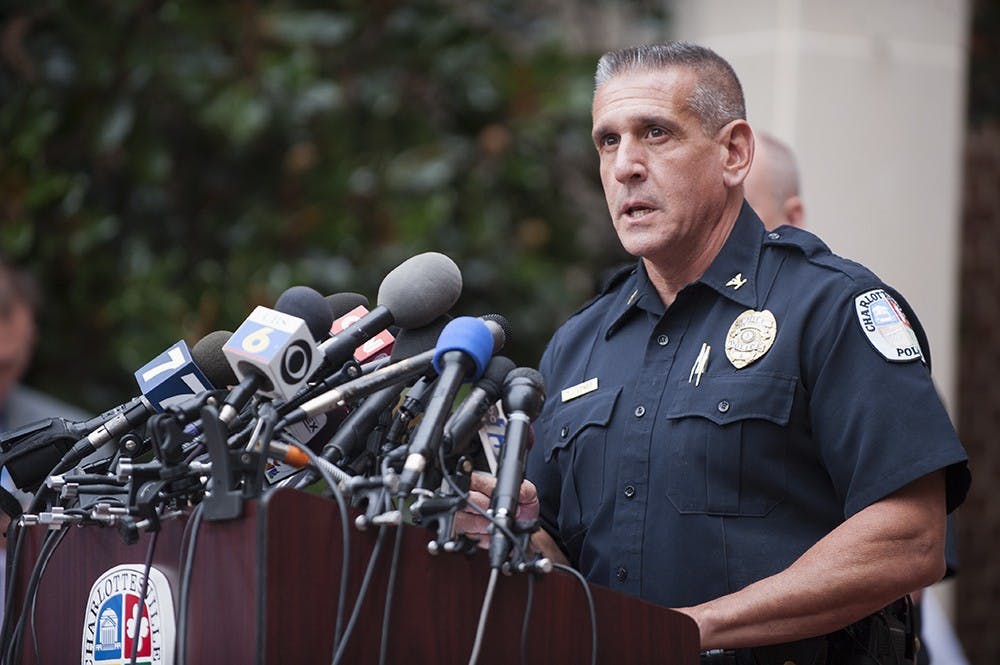Charlottesville Police Chief Timothy Longo announced Monday morning that he will be retiring from his position in 2016.
After 15 years of working as the city’s chief of police, Longo will enter into civilian life and focus his efforts on teaching and consulting, while spending time with his family.
As the city’s police chief, Longo is responsible for overseeing the day to day operations of the department and managing the department’s 127 police officers. He also helps set the budget for the department.
“The Chief and his staff have built an exceptional department dedicated to protecting our residents, businesses and visitors,” Charlottesville City Manager Maurice Jones said in a press release. “His brand of relational policing will be an important part of his legacy.”
Relational policing puts an emphasis on relationships between officers and both their colleagues and the citizens of Charlottesville, Longo said.
“[It encourages] police officers to get out and develop relationships with people in the community and develop a sense of trust and cooperation as we figure out how to deploy various strategies throughout the community that are not only related to public safety, but also improving the quality of life for the people who live here,” Longo said.
The greatest challenge facing the Charlottesville police department, as well as police around the country, is building community trust and cooperation, Longo said. Relational policing is designed to improve the relationship between the community and police force.
The most challenging aspect of his job has been balancing his work and personal life, he said.
“It’s very difficult not to be emotionally attached or otherwise involved in your work. Often times that can take a toll on you and affect your health, and not only your physical health, but your emotional health and your spiritual health,” Longo said.
In the last year, Charlottesville entered the national spotlight following a now-retracted Rolling Stone article detailing an alleged gang rape on Grounds, the Hannah Graham case, and the arrest of Martese Johnson by Virginia Alcoholic Beverage Control agents.
“In the midst of all those cases,” said Longo, “the stakes were high, the issues were obviously very important, and there was a sense of urgency within the community to be kept reasonably informed as to how the investigations [were] proceeding so that [there would be] a level of trust and confidence that we [were] going about our work in the best possible way.”
Although his department was not involved in the Johnson incident, Longo said he felt a sense of responsibility to the community to speak out about it.
Former Vice-Mayor Meredith Richards said Longo has “run a very professional, high-quality organization.”
Richards served on the Charlottesville City Council from 1996 to 2004 and took part in the decision to hire Longo in 2001.
“I remember that we had a big community meeting where we invited leaders in the community to come and meet him before he was hired,” Richards said. “The people in the community who met him were just incredibly impressed with the way he could talk to them and the way he wanted to know more about their issues with policing in the community.”
As the nation has dealt with issues of police brutality and violent arrests, Richards said the city has avoided the full force of these issues due to Longo’s leadership.
“When I was on council, I did not get phone calls from citizens complaining about the police,” Richards said. “I’m not saying there weren’t any issues…I just think it’s a testimony to his understanding of what the role of the police really is — and that’s to protect the citizens and keep the community safe.”
Charlottesville historian, journalist, and University adjunct faculty member Coy Barefoot said Longo’s retirement “marks the end of an era for Charlottesville.”
“During the search for Hannah Graham and her killer, during the reaction to the Rolling Stone article, and facing the simpler day-to-day challenges of city police work, his leadership and professionalism have been a guiding touchstone to see us through,” Barefoot said. “Anyone in law enforcement in America today could benefit tremendously from the example set by my friend Tim Longo.”
Longo’s last day as Chief will be May 1, 2016. In the meantime, the city will begin looking for a new chief before the end of this year.
Longo says he hopes his replacement is “willing to think outside the box and to work closely with the community in a collaborative way to develop a type of policing strategy that this community is comfortable with.”
Richards said she believes Longo is retiring before his time.
“There are a lot of people who, when they retire, you say, ‘Yes, it’s time. It’s time for them to retire. They’ve served their time,’” Richards said. “I can’t say that about him.”







